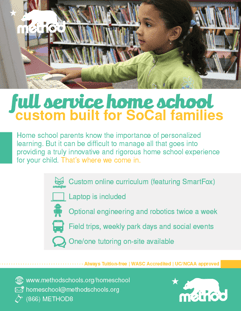Online Homeschooling: Creating the Pefect Learning Environment
Homeschooling is a valuable learning experience, both for children as well as parents. There is a variety of unique reasons to homeschool your children. For some parents, homeschooling is a way to protect their children from dangerous outside influences. Other families find that their children learn better outside of a traditional school environment. Often, traditional classrooms are simply not adequately equipped to support certain learning or social challenges many students face. Regardless of the exact reason, homeschooling your child is an extremely important investment for their future. Online homeschooling is a powerful learning alternative to help your child thrive. Even with a great program, homeschooling isn't effective without creating the proper learning environment within your home.
Encouraging Cleanliness
It's difficult if not impossible to accomplish tasks when trapped in a messy, cluttered space. This is true not only for adults but also for children and teens. Messy rooms are depressing; it breeds negative feelings and kills motivation. Regardless of where your child studies, take time to ensure that it is clean and organized. The desk or workspace your child uses should always be neat and organized. Invest in good office storage containers and desk organizers. This prevents distraction and allows your child to quickly find whatever supplies they need for their schooling. A clean room also eliminates many distractions.
Managing the Noise Level
Noise is a common distraction for many students. Although we can't control outside noises such as garbage trucks, car alarms, or lawn mowers, we can manage the noise level inside our house. Avoid noisy household chores such as vacuuming during your child's school hours. However, don't remove sound completely. Stark, empty silence can prove to be just as distracting to your child. Using classical music or soft jazz as background, "study" music creates a great learning environment. John Hopkins University found that proper background music hugely improved the concentration, creativity, and memory of students. These benefits are vital!
Eliminating Excessive Media
Although your child is learning through a computer, it's still important to monitor their media access during school hours. Excess media and tech such as cell phones, tablets, iPods, and hand-held games are major distractions regardless of your child's age. If your child is constantly switching between open tabs on the computer, it's tricky if not impossible for them to give their whole attention to their studies. Talk with them and help them see the importance of eliminating media distractions during their lessons. Periodically check on them and monitor what devices they are using during school. Reserve cell phones and games for after school or during breaks.
Creating the Proper Atmosphere
Even a clean, organized room may not be enough for some students. Finding the best learning atmosphere for your child is a unique process. No two students are alike. Some children learn best in enclosed rooms. Others cannot concentrate unless they're exposed to the outdoors. This learning individuality is based on many things such as temperature, smell, lighting, and environment. Experiment with your child. Have them try several rooms in the house before you settle on a specific "school room." The difference in their productivity may shock both of you. For example, they may find it impossible to get anything done in their bedroom but thrive when working in the kitchen or living room.
Taking Adequate Breaks
When homeschooling, it's tempting to set aside only one specific chunk of time for studying. Rather than having your child push themselves through the whole study period in one "marathon" session, experiment by breaking up their school hours. Breaks are extremely important. Taking a step away from the computer, books, and questions allows your child to refresh their mind and body. Working too hard for too long causes students of any age to become overwhelmed and exhausted--mentally and physically. Break up the school day into manageable chunks of time with adequate "breathing" breaks and a lunch period. Even a break as small as 15 minutes for a quick snack can radically improve your child's learning attitude.
Creating Incentives
Everyone works better when presented incentives and rewards. Even as adults, we find ourself far more excited about a task when we know there's a reward at the end. If this is true for us as adults, then even more so for children and teens. Although we shouldn't feel as though we're "bribing" our children to learn, there is nothing wrong with offering small weekly or monthly incentives for quickly and thoroughly completing their school assignments. For younger children, using a reward sticker chart or completion poster are great ways of visually tracking their progress. Older students and teens enjoy monitoring their schedule with planners and desk charts. Get creative with the reward incentives you choose. The rewards can be something as small as a McDonald's Happy Meal for younger students. Cell phone time, game privileges or specific social activities are great incentives for teen students.
Taking the time to create the proper learning environment for your child is priceless. Even small changes can lead to huge boosts in their learning and productivity. Some improvements are immediately obvious; others may surface with time. Even your child will probably notice these positive changes. They will no doubt enjoy their school time far more. If your child is struggling with their schooling and productivity, step back and take a look at their learning environment. With a careful eye, you can eliminate many distractions and poor learning environments.
More tools:
Download a Flyer
-or-




-1.svg)
-1.svg)
.svg)
.svg)
.svg)

.svg)










.svg)
.svg)


